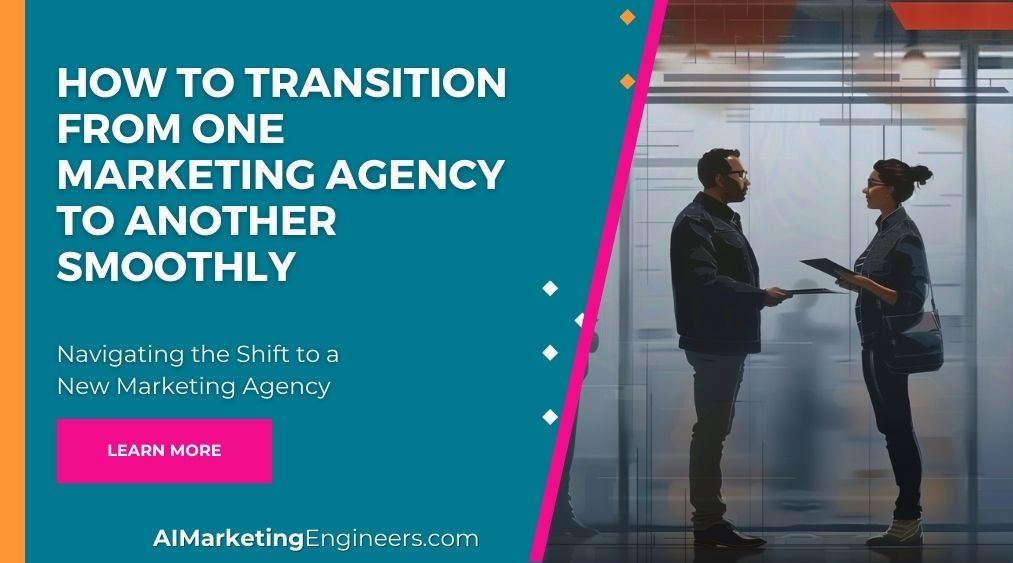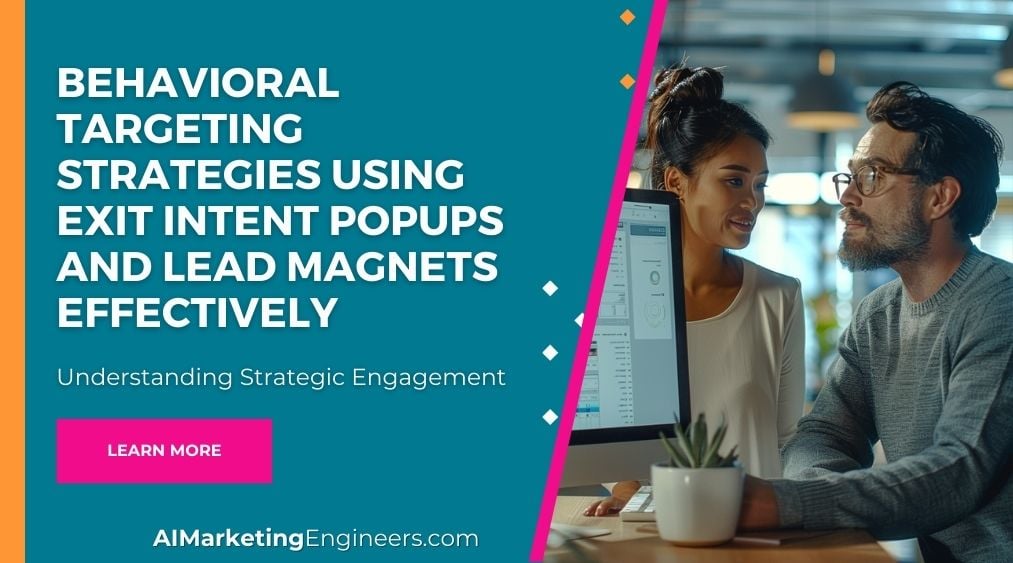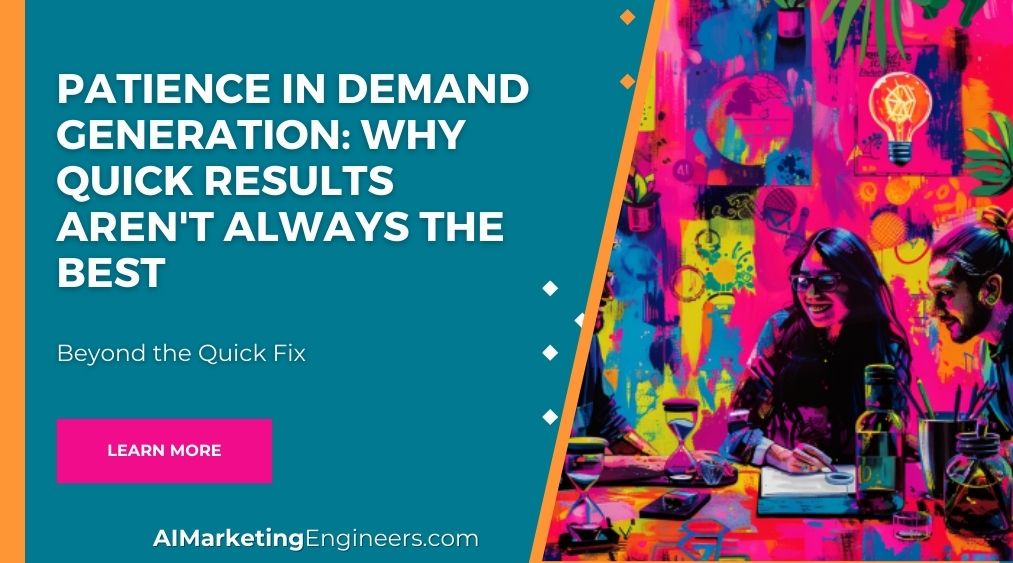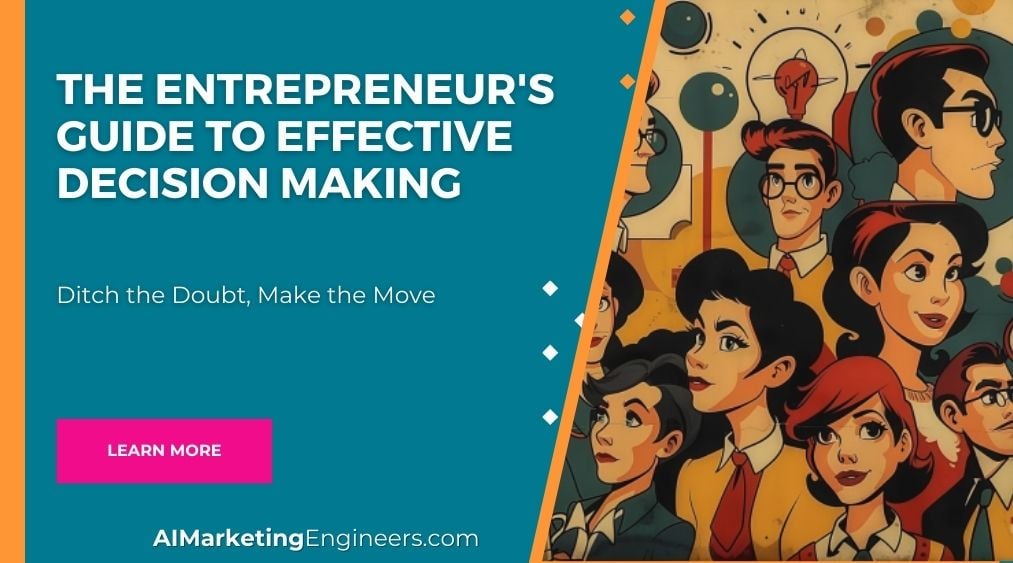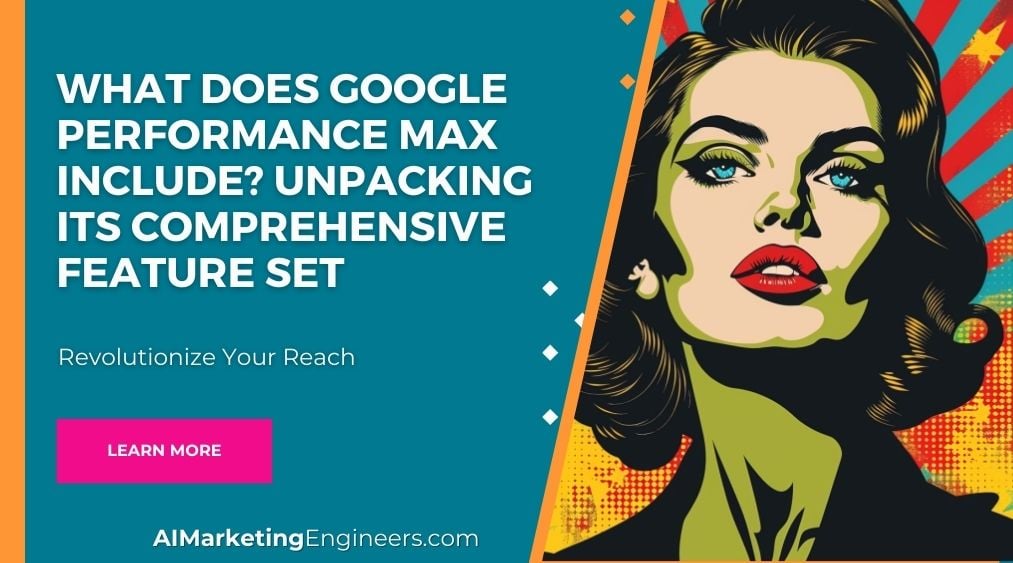Key Takeaways
✅ Plan and Communicate Effectively: Setting clear expectations and communicating openly with all involved parties is essential. Define the transition scope, clarify roles and responsibilities, and establish a detailed plan to manage the process effectively.
✅ Secure Your Digital Assets: Ensure continuous control over digital assets like domain names, social media accounts, and marketing platforms. Obtain administrative access, transfer ownership where necessary, and download vital data ahead of the transition.
✅ Manage the Transition Process Efficiently: Efficient management minimizes downtime and disruptions. Induct the new agency thoroughly, address financial implications, and seek professional guidance to review contracts and protect your interests.
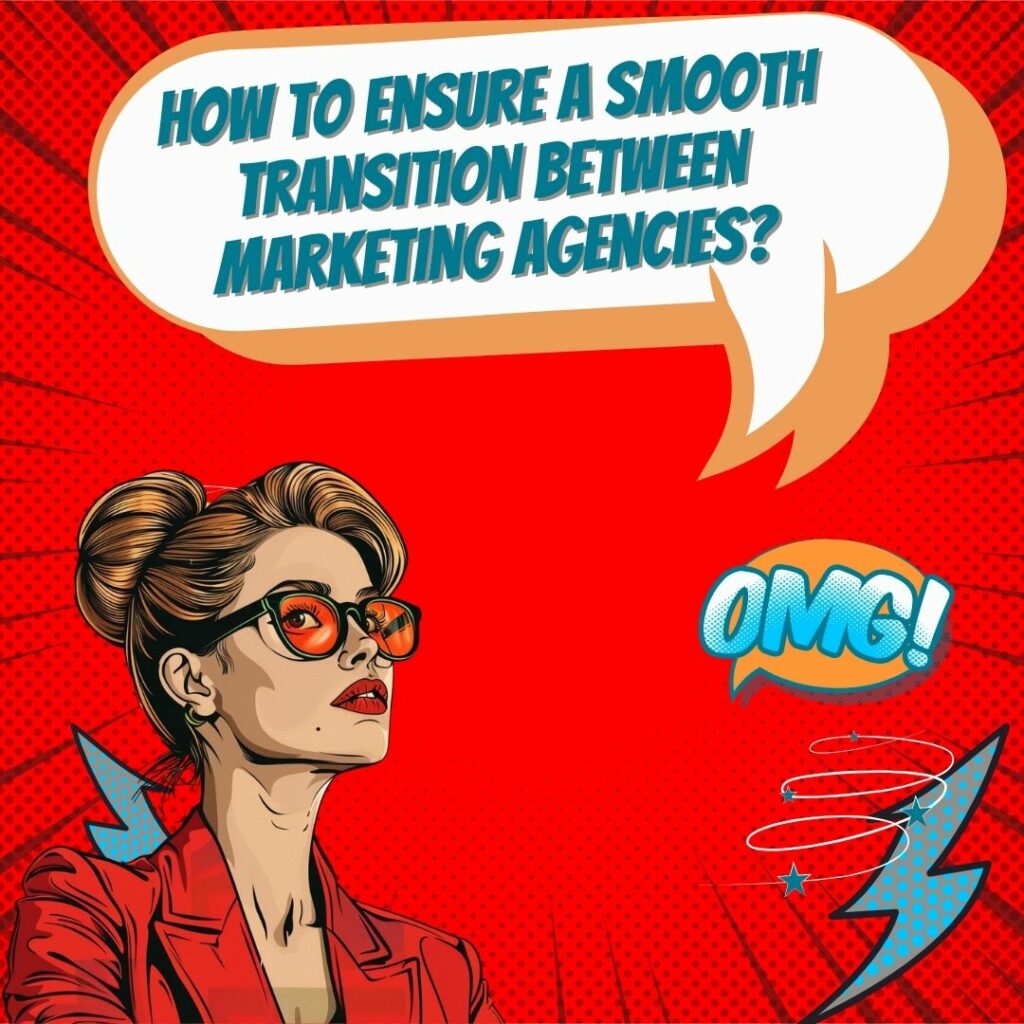 Introduction
Introduction
Transitioning from one marketing agency to another can be a daunting task, but with the right strategy, it can be a seamless and beneficial move. Whether you're looking for fresh ideas, better alignment with your goals, or improved performance, the key to a successful transition lies in thorough planning and clear communication. By carefully managing the handover process, you can minimize disruptions, maintain campaign momentum, and set the stage for future success with your new agency.
Start by conducting a comprehensive review of your current agency's work, identifying what has worked well and what hasn't. This will help you clearly communicate your needs and expectations to the new agency. Next, create a detailed transition plan that outlines key milestones, timelines, and responsibilities. Involve both agencies in the planning process to ensure a smooth knowledge transfer and avoid any gaps in your marketing efforts. With these steps, you can confidently navigate the transition and unlock new opportunities for growth and innovation.
Top Statistics
| Statistic | Insight |
|---|---|
| Global digital ad spend: Expected to increase by 8.4% in 2024, reaching over $526 billion. | This significant growth highlights the continuously expanding digital marketplace, emphasizing the need for agencies to stay ahead with innovative and effective ad strategies. |
| US social media ad spend: Reached $72.3 billion in 2023, a 9% increase from 2022. | The rise in social media ad expenditure underscores the importance of having a robust social media strategy. Transitioning agencies should ensure social media campaigns are seamlessly managed. |
| 92% of marketers: Recognize content as a critical business asset for securing long-term return on investment. | Content is king, and recognizing it as such will help ensure your campaigns stay relevant and impactful during any transition between agencies. |
| Marketers with a single source of truth for data: Are 56% more likely to be strongly aligned with their sales team. | Alignment between marketing and sales is crucial, and having a unified data source can facilitate a smooth transition and ensure continuity in strategy and communication. |
| Micro-influencers: Drive higher engagement with content, with 37% of marketers saying they are effective. | Engagement levels can make or break marketing efforts. Leveraging micro-influencers can bolster engagement, especially when transitioning campaigns from one agency to another. |
Evaluate and Prepare
Evaluating the performance of your current agency is the first crucial step before making any major decisions. Identify areas where the agency is falling short or where the marketing strategy shows gaps. Also, review your contract comprehensively. Understand the terms, including termination penalties, fees, and licenses. What are your reasons for wanting to switch? Contemplate whether it's due to costs, performance issues, or a cultural misalignment. Ensure you have all necessary data and assets, such as domain ownership, social media access, and email marketing platforms, securely in your possession. Take the time to document all the issues and successes to provide a clear picture to the new agency.
Selecting the Right New Agency
Choosing the right new agency can make all the difference. Select one with a solid track record of meeting goals and deadlines. Does this agency have experience with transitions? If yes, it should be able to provide a smooth takeover process. Clarification is key; ask for an audit to gain valuable insights into your website and overall marketing strategy. Don't skip this crucial step — it's your way of knowing what you'll get into. Also, look for reviews and testimonials from their previous clients. Schedule interviews with key team members to gauge their expertise and compatibility with your business needs.
Ensuring a Smooth Transition
Clear communication is essential. Ensure both old and new agencies are on the same page to facilitate a seamless handover. Establish a detailed transition plan that outlines the scope of the transition, transfer of intellectual property, technology compatibility, process transitions, and contract cost resolutions. The new agency should employ a comprehensive induction process to align with your marketing team and other agencies in your roster. Is everyone clear on their roles and responsibilities during this period? Regular meetings and status updates will help keep the transition on track. Document all the processes to ensure nothing is missed during the handover.
Securing Digital Assets
Retaining control over your digital assets is non-negotiable. This includes domain names, social media accounts, directory listings, search marketing platforms, email marketing platforms, and analytics accounts. Make sure you have administrative access to all these platforms and have downloaded essential assets and data before the transition begins. Losing access to these assets can be disastrous; take inventory and secure them meticulously. Ensure passwords are updated and access is restricted to authorized personnel only. Regularly back up your data to prevent any loss during the transition.
Managing the Transition Process
Be ready to tackle any potential costs and risks associated with the transition. This includes the possible loss of valuable intellectual property and legal risks. Plan for the time and resources that will be required to manage the change effectively. Should you consider experts who specialize in transitions to minimize hidden costs and potential risks? This could be a wise move to ensure all bases are covered and nothing is overlooked in the process. Keep an eye on the progress and address any issues promptly. A detailed checklist can help keep the transition on track and ensure a smooth process.
Building a Strong Relationship Post-Transition
Once the transition is complete, focus on building a strong relationship with your new agency. Make sure they understand your business goals and expectations clearly. Utilize their fresh perspective and insights to refine and enhance your marketing strategy. Continuously evaluate the effectiveness of your strategy and make improvements to achieve the best results. How will you capitalize on the new agency's innovative approaches to drive your marketing success? Regular feedback sessions will help in maintaining alignment with your goals. Celebrate quick wins to build morale and set the tone for a successful partnership.
AI Marketing Engineers Recommendation
Recommendation 1: Leverage Data-Driven Onboarding Processes: When transitioning from one marketing agency to another smoothly, creating a data-driven onboarding process can minimize hiccups and maintain momentum. According to a survey by Econsultancy, companies that invest in data-driven marketing are three times more likely to improve their decision-making processes. Ensure that your new agency has access to comprehensive performance data and analytics from your previous campaigns. This transparency allows them to quickly understand what has been working and where improvements are needed, facilitating a seamless transition with minimal disruptions.
Recommendation 2: Embrace Continuous Communication and Strategic Planning: The key to a successful transition from one marketing agency to another smoothly lies in proactive and ongoing communication. Current trends indicate that businesses focusing on transparent communication with their agencies achieve a 20% increase in marketing effectiveness, as highlighted by the Content Marketing Institute. Schedule regular check-ins and strategy sessions from the onset to align goals, set expectations, and ensure that both internal teams and the new agency are on the same page. This approach not only builds trust but also aids in a smoother and more strategic transition.
Recommendation 3: Utilize Comprehensive Customer Relationship Management (CRM) Tools: Implementing robust CRM tools can significantly ease the transition from one marketing agency to another smoothly. CRM platforms like HubSpot or Salesforce play a crucial role in maintaining continuity. These tools allow your new agency to access a centralized repository of all previous client communications, lead interactions, and campaign performance metrics, ensuring no valuable information is lost during the handover. According to Nucleus Research, CRM users see an average return of $8.71 for every dollar spent. This investment not only facilitates a smoother transition but also positions your marketing strategies for sustained success.
Relevant Links
- How to Define a Good Conversion Rate for Your Business: Metrics that Matter
- Strategies for Campaign Optimization: A/B Testing and Conversion Rate
- Best Practices for Campaign Execution and Implementation Strategy
- Leveraging Customer Insights and Market Research to Improve Consumer Analysis
Conclusion
Transitioning from one marketing agency to another can seem daunting, but with careful planning and communication, it can be a smooth and beneficial process. Evaluating and preparing before making the transition is crucial. Understanding your current agency's performance and the reasons for moving on will set a solid foundation. When choosing your new agency, look for a partner with a proven track record and experience in handling transitions.
Ensuring a smooth transition involves clear communication, a detailed plan, and securing all your digital assets. Remember, maintaining control over essential platforms and data is vital to avoid disruptions. Managing the transition process requires time and resources, but with the right support, potential pitfalls can be minimized.
After the transition, focus on building a strong relationship with your new agency. Their fresh perspective can provide valuable insights to enhance your marketing strategy. Continuously refining your approach will keep your business goals on track. By following these steps, you can turn what might seem like a challenging switch into a strategic move that benefits your business in the long run.
FAQs
Question 1: Why is a smooth transition important?
Answer: A smooth transition ensures minimal disruption to marketing efforts, maintains client satisfaction, and allows for a seamless handover of responsibilities
Question 2: What are the key steps in transitioning to a new agency?
Answer: Key steps include:
- Asking for assets and reports from the existing agency.
- Evaluating the new agency through questions about their capabilities, performance, and client retention.
- Ensuring a detailed plan for account takeover and communication structure.
- Meeting with the account executive and discussing contractual obligations.
Question 3: How do I evaluate a new agency's capabilities?
Answer: Ask questions about their client base, average annual spend, revenue from paid media, and case studies. Also, inquire about their experience in your industry and their approach to client retention.
Question 4: What should I look for in a new agency's transition plan?
Answer: Ensure the plan includes a detailed process for account takeover, communication structure, and collaboration. The agency should also provide a clear plan for tracking leads and performance metrics.
Question 5: How do I ensure a seamless handover of responsibilities?
Answer: Schedule a meeting with the new agency to discuss key deliverables, strategy frameworks, and logistics of account access transfers. This ensures the new agency can pick up where the previous one left off.
Question 6: What questions should I ask the new agency during the transition?
Answer: Ask about their approach to taking over accounts, ownership of accounts, tracking leads, communication structure, and contractual obligations. Also, inquire about their experience with similar clients and their strategy for a smooth transition.
Question 7: How can I maintain control during the transition?
Answer: Ensure you have access to all necessary assets and reports. Set clear expectations for communication and collaboration with the new agency. Regularly meet with the account executive to monitor progress and address any concerns.
Question 8: What are the benefits of a solid transition plan?
Answer: A solid transition plan enables a seamless handover, minimizes disruption to marketing efforts, and ensures the new agency can build upon previous work. It also fosters trust and collaboration between the client and the new agency.
Academic References
- Kotler, P., & Keller, K. L. (2020). Transformative Marketing in the New Normal. Journal of Business Research, 115, 1-7. This article provides insights on transformative marketing in business-to-business (B2B) marketing, focusing on the marketing mix challenges, opportunities, and solutions during crises. It offers practical suggestions for B2B marketers to navigate and recover from crises.
- Smith, J. B., & Colgate, M. (2007). A Model of Product-to-Service Brand Extension Success Factors in B2B Buying Contexts. Industrial Marketing Management, 36(3), 374-379. This study explores the success factors for product-to-service brand extensions in B2B buying contexts, which can be relevant in understanding how to transition marketing strategies effectively.
- Hwang, Y., & Park, S. (2021). The Role of Sense of Community in Harnessing the Wisdom of Crowds and Creating Collaborative Knowledge During the COVID-19 Pandemic. Journal of Interactive Marketing, 54, 28-45. This research highlights the importance of community engagement and collaborative knowledge in marketing strategies, which can be crucial in ensuring a smooth transition between agencies.
- Ahmad, S., & Awada, R. (2020). Et-Moone and Marketing Relationship Governance: The Effect of Digital Transformation and ICT During the COVID-19 Pandemic. Journal of Relationship Marketing, 19(3), 192-212. This study examines the impact of digital transformation and information and communication technology (ICT) on marketing relationship governance during crises, providing insights on how to manage marketing relationships effectively during transitions.
- Johnson, M. D., & Meyer, J. W. (2018). Omnichannel Management in B2B. Journal of Marketing Development and Competitiveness, 12(1), 60-71. This research focuses on omnichannel management in B2B contexts, which can be relevant in understanding how to integrate marketing strategies across different channels during a transition.
